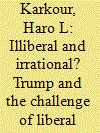| Srl | Item |
| 1 |
ID:
182566


|
|
|
|
|
| Summary/Abstract |
Building on a growing body of literature on the application of Morgenthau’s ethics to post-Cold War US foreign policy, this article applies Morgenthau’s concept of irrationality to Trump’s foreign policy. Based on this application, the article highlights the limit of rationality in Morgenthau’s theoretical analysis. Specifically, the article argues, pace neo-realist critiques of ‘liberal hegemony’, that Trump reveals an empirical puzzle: US foreign policy can be both irrational and illiberal simultaneously in the pursuit of nationalistic universalism. This is the case, the article argues, because nationalistic universalism in Morgenthau’s analysis is not rooted in liberalism per se but the dynamics of liberal modernity. The Trump puzzle thus reveals an on-going tension between rationality and liberal modernity in Morgenthau’s theoretical analysis: rationality offers an insufficient tool to take upon the challenge of liberal modernity from which Trump’s nationalistic universalism stems. This, the article concludes, leaves Morgenthau’s concept of interest ‘defined in terms of power’ open to misappropriation to ends contrary to their original aim: furthering nationalistic universalism, rather than limiting power.
|
|
|
|
|
|
|
|
|
|
|
|
|
|
|
|
| 2 |
ID:
097322


|
|
|
| 3 |
ID:
090508


|
|
|
| 4 |
ID:
114697


|
|
|
|
|
| Publication |
2012.
|
| Summary/Abstract |
In March 2005, riots erupted in South Korea against Japan in reaction to Japan's claims of sovereignty over some rocky uninhabited islets (0.23 km2). What explains the moral outrage against Japan, the severity of which could have erupted into a military conflict? Such outrage is a puzzle for two reasons. First, the probability that South Korea could defeat Japan is nil, especially since the US-Japan alliance dominates the US-South Korean alliance. Second, even if the probability of defeating Japan was 100%, the net benefit of conflict was apparently negative - given the meager potential reward vis-à-vis the cost of war. This article offers a rational choice model that demonstrates that the moral outrage cannot be explained as a strategic threat. The analysis demonstrates that sociological and evolutionary game explanations are also unconvincing. This calls for an evaluation of how emotions relate to rational choice in international conflicts.
|
|
|
|
|
|
|
|
|
|
|
|
|
|
|
|